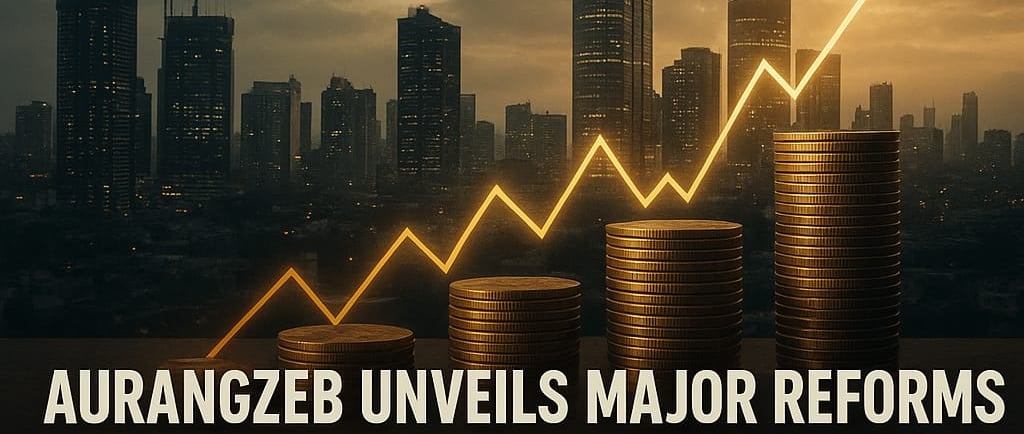Aurangzeb Announces Major Economic Reforms | Lower Tariffs, Stronger Capital Markets & Investor Confidence
Pakistan’s Finance Minister Muhammad Aurangzeb unveils key economic reforms, including lower tariffs, stronger capital markets, and improved investor confidence. Learn how these changes aim to boost growth, exports, and industrial development.
NATIONALBUSINESS
8/19/20252 min read


Pakistan Finalizing New Industrial Policy to Boost Growth and Investment
KARACHI: Finance Minister Muhammad Aurangzeb announced on Monday that the government is in the final stages of preparing a comprehensive industrial policy aimed at creating a more business-friendly environment, spurring industrialisation, and ensuring long-term economic stability.
Speaking at a consultative workshop titled “Unlocking Capital Market Potential for Banks”, jointly hosted by the Securities and Exchange Commission of Pakistan (SECP) and the Pakistan Banks Association (PBA), the minister revealed that the policy, led by Special Assistant to the Prime Minister Haroon Akhtar Khan, will soon be presented before the federal cabinet for approval.
Tariff Reforms and Export Competitiveness
Aurangzeb highlighted that the government is committed to introducing tariff reforms under a home-grown strategy. These reforms include gradually cutting customs duties, additional customs duties, and regulatory duties over the next four to five years. The move is expected to eliminate protectionist barriers that have long hindered local industries and improve Pakistan’s export competitiveness.
Addressing concerns that lower tariffs could reduce revenue, the finance minister stressed the importance of long-term planning over short-term fiscal gains. “We must focus on national interest and sustainable growth, rather than temporary revenue fixes,” he said.
Structural Shift in Tax Policy
In a major structural change, Aurangzeb revealed that the Tax Policy Office has now been shifted to the Finance Division. From the FY27 federal budget onwards, the Finance Division will design tax policies, while the Federal Board of Revenue (FBR) will only handle tax administration. This separation aims to improve efficiency and transparency in fiscal management.
Strengthening Capital Markets
The minister also proposed forming a Capital Market Development Council to spearhead reforms and growth in Pakistan’s financial markets. He noted that strong and efficient capital markets are crucial for achieving macroeconomic stability.
Economic Outlook and Governance
Aurangzeb reaffirmed that Pakistan has successfully exited the FATF grey list and expressed confidence that the country will remain compliant in the future. On monetary matters, he stressed that the State Bank of Pakistan (SBP) retains full independence in determining exchange rate policy.
The minister further warned that climate change and rapid population growth remain the most pressing threats to Pakistan’s long-term development. Referring to the recent floods in Khyber Pakhtunkhwa, he said it was premature to assess total damages as relief efforts were still underway.
Private Sector Role in Growth
Later, while inaugurating the PHC Job Fair and Education Expo 3.0 at the Karachi Expo Centre, Aurangzeb stated that Pakistan has achieved macroeconomic stability over the past two years and is now ready to move into a growth phase. He urged the private sector to play a leading role in driving investment and industrial expansion.
As part of ongoing tax reforms, he also mentioned that the government is working to lower tax rates for manufacturers and salaried individuals to ease financial pressure and encourage compliance.
Investor Confidence on the Rise
Aurangzeb noted that several international credit rating agencies have recently aligned in their positive assessment of Pakistan’s economy, signalling a recovery in investor confidence. However, he expressed disappointment at the absence of leading corporate giants at the expo and called for their active participation in shaping Pakistan’s future economic direction.
Explore
Your lens into Pakistan's vibrant stories.
Connect
Discover
+92-300-0440097
© 2025. All rights reserved.
